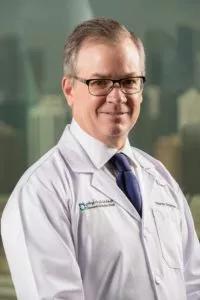Research by surgical oncologists at Cleveland Clinic and Cleveland Clinic Abu Dhabi notes the benefit of completing surgery, chemotherapy and radiation within 38 weeks of diagnosis

Research from Cleveland Clinic and Cleveland Clinic Abu Dhabi has found an increase in patient survival rates when treatment options – surgery, chemotherapy and radiation – are completed within 38 weeks from the time of diagnosis.
The observational study, which included more than 28,000 breast cancer patients registered in the American National Cancer Database, is the largest of its kind to evaluate breast cancer survival and time to completion for all therapies. It found the treatment duration of less than 38 weeks was associated with a higher five-year survival – 89.9 percent compared to the 83.3 percent in the greater than 38 weeks treatment duration. This builds on previous research that noted poorer outcomes when there was a delay in time to treatment initiation, although time to treatment completion was not assessed in these studies.
The study’s authors point out it is important to identify the reasons for delays in treatment and where in the process they occur, and to design programs to measure and pursue optimization of time to treatment to decrease anxiety for patients and improve their chances of survival.

Image content: This image is available to view online.
View image online (https://assets.clevelandclinic.org/transform/26e02559-dac6-4225-9bdd-34056361cadd/-----------240x300)
Debra Pratt, M.D.
“The biggest difference in our study from others that have looked at time to treat was that we looked at the time from diagnosis to the completion of the multimodality treatment, not only at one individual part, to identify the 38-week window to improve survival rate for patients with breast cancer,” said Debra Pratt M.D., director of the Breast Center at Cleveland Clinic Fairview Hospital, and the lead author of the study.
“In breast and other cancers, patients don’t only get surgery, but may also require chemotherapy and radiation therapy,” Dr. Pratt said. “This becomes a complicated system to navigate and there are multiple reasons why delays arise in treatment being completed. This analysis helps us identify opportunities for improving care within the delivery systems.”
Other studies evaluating the time to treatment for breast cancer by individual treatment modality have concluded that the optimal time from diagnosis to first surgical treatment was less than 90 days from diagnosis; less than 120 days from diagnosis to adjuvant chemotherapy; and when chemo is administered, the radiation should start less than 365 days from date of diagnosis. The last two are consistent with Commission on Cancer’s Cancer Central Clinical Participant Registry (C3PR) quality indicators, which uses registry data to measure quality of cancer care.
“What we found is that the optimal time for treatment completion is 99 days shorter than C3PR quality indicators,” Dr. Pratt said. “We have so much more data now to reassess these quality indicators and determine what those metrics should be.”
The study did not allow researchers to gauge the causes for delays beyond 38 weeks, but Dr. Pratt said from experience, she can divide them into medical, personal and systemic factors.
“If patients have medical issues, they may have to go through other assessments, such as cardiac clearance, which are done as a precaution,” she explained. “These are the hardest to control. Other delays are personal, for example, where the patient does not want to be seen at the first appointment available because of financial reasons or chooses to prioritize a family event over surgery.”
She says medical facilities can, however, control some of the systemic factors to speed up the process. These include adequate staffing and improved systems to increase ease of access, such as making special reservations to schedule urgent assessments like metastatic surveys and breast MRI, as well as a reduction in insurance delays in approving tests required to complete pre-treatment assessments.

Image content: This image is available to view online.
View image online (https://assets.clevelandclinic.org/transform/1156dd1a-7248-49b3-a44b-ff449f8b7916/----------200x300)
Stephen Grobmyer, M.D.
Stephen Grobmyer, M.D., chair of the Oncology Institute at Cleveland Clinic Abu Dhabi, an integral part of Mubadala Health, and a co-author on the study, says that care must be consolidated to help patients receive treatment on time.
“What we see happen traditionally in the U.S. and even in the U.A.E. is that the patient has to visit multiple specialists – first a surgeon, then a medical oncologist for chemotherapy followed by a radiation oncologist – all of which are scheduled weeks apart and in different places,” he said. “There is this phenomenon of ‘serial care,’ rather than coordinated and planned care.”
Dr. Grobmyer adds that Cleveland Clinic has tried to avoid this issue with its coordinated multidisciplinary cancer programing. For example, in preparation of the opening of its cancer tower, Cleveland Clinic Abu Dhabi opened its dedicated Breast Health Clinic last year. The facility offers targeted diagnostic testing, genetic counseling, innovative therapies and treatments, as well as reconstruction specialists and disease-specific experts to address all breast health issues, in one location and in the shortest time possible.
“We are trying to anticipate the needs of the patients and plan for all their treatment from the beginning so that it is seamless, efficient and reduces their anxiety,” he said. “We have also started measuring time to treatment as a quality measure.”
Dr. Pratt said further studies to determine which type of treatment has the most delays will aid their efforts in optimizing care.
“One of the data points missing in our study was the last day of chemotherapy for these patients, so we could not determine where the majority of delays occurred,” she said. “One of my hopes is to look at our patients’ data to know where the challenges lie and how we can fix them.”
Elizabeth Elphick, +971-50-705-9518, elizabeth.elphick@wallispr.com
Tora Vinci, 216-339-4277, vinciv@ccf.org
About Cleveland Clinic
Cleveland Clinic – now in its centennial year – is a nonprofit multispecialty academic medical center that integrates clinical and hospital care with research and education. Located in Cleveland, Ohio, it was founded in 1921 by four renowned physicians with a vision of providing outstanding patient care based upon the principles of cooperation, compassion and innovation. Cleveland Clinic has pioneered many medical breakthroughs, including coronary artery bypass surgery and the first face transplant in the United States. U.S. News & World Report consistently names Cleveland Clinic as one of the nation’s best hospitals in its annual “America’s Best Hospitals” survey. Among Cleveland Clinic’s 70,800 employees worldwide are more than 4,660 salaried physicians and researchers, and 18,500 registered nurses and advanced practice providers, representing 140 medical specialties and subspecialties. Cleveland Clinic is a 6,500-bed health system that includes a 173-acre main campus near downtown Cleveland, 19 hospitals, more than 220 outpatient facilities, and locations in southeast Florida; Las Vegas, Nevada; Toronto, Canada; Abu Dhabi, UAE; and London, England. In 2020, there were 8.7 million total outpatient visits, 273,000 hospital admissions and observations, and 217,000 surgical cases throughout Cleveland Clinic’s health system. Patients came for treatment from every state and 185 countries. Visit us at clevelandclinic.org. Follow us at twitter.com/ClevelandClinic.
About Cleveland Clinic Abu Dhabi
Cleveland Clinic Abu Dhabi, an integral part of Mubadala Health, is a multispecialty hospital on Al Maryah Island in Abu Dhabi, UAE. Cleveland Clinic Abu Dhabi is a unique and unparalleled extension of US-based Cleveland Clinic’s model of care, specifically designed to address a range of complex and critical care requirements unique to the Abu Dhabi population.
Cleveland Clinic Abu Dhabi has the following Institutes: Heart & Vascular, Neurological, Digestive Disease, Eye, Respiratory, Critical Care, Surgical Subspecialties, Medical Subspecialties, Emergency Medicine, Anesthesiology, Pathology & Laboratory Medicine, Imaging, Quality & Patient Safety, and Clinical & Nursing. In all, more than 40 medical and surgical specialties are represented at Cleveland Clinic Abu Dhabi.
The facilities at Cleveland Clinic Abu Dhabi combine state-of-the-art amenities and world-class service standards. The hospital is a 394 (expandable to 490) bed facility, with five clinical floors, three diagnostic and treatment levels, and 13 floors of critical and acute inpatient units. It is a physician-led medical facility served by North American/European Board Certified (or equivalent) physicians. Cleveland Clinic Abu Dhabi provides patients in the region direct access to the world’s best healthcare providers and Cleveland Clinic’s unique model of care, reducing their need to travel abroad for treatment.
Cleveland Clinic Abu Dhabi – Al Ain began offering select medical services in December 2017. The facility is located on the Tawam Hospital Campus in Al Ain.
Visit us at www.clevelandclinicabudhabi.ae
About Mubadala Health
Mubadala Health is the integrated healthcare network of Mubadala Investment Company. Established in 2021, Mubadala Health operates, manages, and develops a portfolio of healthcare assets including: Cleveland Clinic Abu Dhabi, Healthpoint, Imperial College London Diabetes Centre (ICLDC), Amana Healthcare, National Reference Laboratory (NRL), Capital Health Screening Centre (CHSC), Abu Dhabi Telemedicine Centre (ADTC), Danat Al Emarat, HealthPlus Diabetes & Endocrinology Center, HealthPlus Family Clinics, HealthPlus Fertility, HealthPlus Women’s Health Center, Moorfields Eye Hospital Abu Dhabi, and a stake in Al Meswak Dental Clinics Group. With a vision to transform the regional healthcare landscape, Mubadala Health sets a new benchmark for the UAE and regional healthcare industry through its state-of-the-art facilities and world-class caregivers who strive to put patients first across its continuum of care. Innovation, research, and education are the foundational pillars of Mubadala Health, supporting the further development of a sustainable healthcare sector in line with the vision of Abu Dhabi and the region.
Mubadala Health is on Twitter, Instagram, Facebook and LinkedIn with the handle: @mubadalahealth.